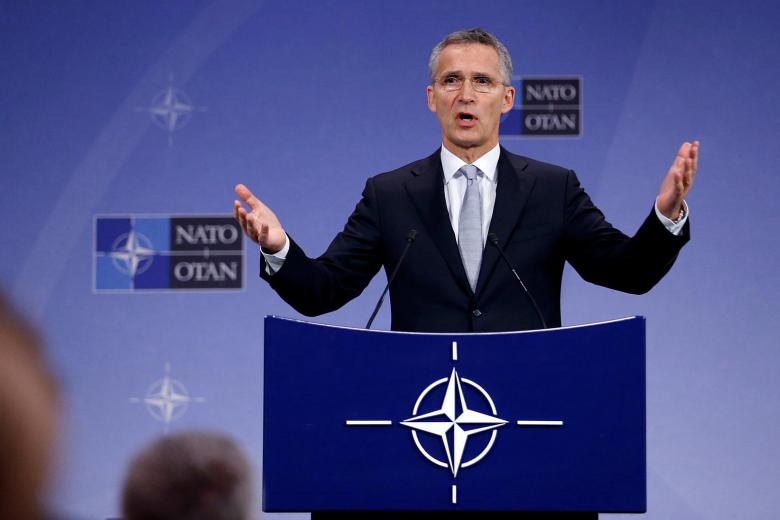BRUSSELS (BLOOMBERG) - Russian President Vladimir Putin must help defeat Islamic State in Iraq and Syria (ISIS) terrorism rather than bomb civilians in Aleppo, the US envoy to Nato has said, as the western alliance's defence ministers meet for the first time since Russia stepped up its air attacks in Syria.
US Ambassador to the North Atlantic Treaty Organisation Douglas Lute said the alliance is closely monitoring the passage of Russian warships toward the Mediterranean and is concerned they may be used in the devastating bombing raids on civilian targets.
Nato scolded Russia for its aggressive stance in Syria and its failure to abide by the terms of the peace process in Ukraine.
"There's plenty of work to do together against ISIL and Al-Nusra and the international terrorist element in Syria and we call on Russia to focus on those common enemies," Mr Lute said, using an alternative acronym for ISIS. "The reason given for the Russian intervention in Syria was to target ISIL and it's continually the case that that's not who they're targeting."
Russia's support of President Bashar al-Assad's regime in Syria, as well as its backing of violent separatists in eastern Ukraine, is adding to nervousness in the West about the scale of Mr Putin's military ambitions.
With Nato focusing its attention on boosting the size and speed of its potential military response, the two sides are as far apart as at any time since the end of the Cold War.
While neither Russia's involvement in Syria nor its failure to meet the terms of the Minsk ceasefire agreement for Ukraine are formal items on the agenda for the defence ministers of Nato's 28 countries who meet in Brussels on Wednesday (Oct 26) and Thursday (Oct 27), the continuing violence at the alliance's north-east and south-east frontiers is casting a shadow over their discussions.
"One thing they will want to address is whether we all have the capacity to read Russia's behaviour satisfactorily," said Mr Adam Thomson, the UK's ambassador to Nato. "Russia is doing a lot of new, unfamiliar things; it's obviously trying to signal, but it's not clear that we know how to understand those signals."
About 10 Russian warships and support vessels, led by aircraft carrier Admiral Kuznetsov, passed through the English Channel between the UK and mainland Europe on Friday (Oct 21) and Nato officials believe they will arrive close to the Syrian coast in November.
Amid reports that Spain could allow the ships to refuel in its north African enclave of Ceuta, Nato Secretary-General Jens Stoltenberg said governments need to be clear that the vessels may aid the attacks on the Syrian city of Aleppo.
"It is for each nation to decide whether these ships can get supplies and fuelling and be fuelled in different harbours along the route toward the eastern Mediterranean," Mr Stoltenberg told reporters. "But at the same time we are concerned, and I have expressed that very clearly, about potential use of this battle group to increase Russia's ability and to be a platform for air strikes."
International condemnation of Russia's military campaign has grown after hundreds of people were killed in the besieged city of Aleppo since Mr Assad's forces, backed by the Kremlin, stepped up attacks on rebel-held areas of the city. US and European leaders have accused Mr Putin of war crimes and have dangled the threat of sanctions in response.
"More air strikes by Russian planes will exacerbate the humanitarian suffering in Aleppo and therefore we call on Russia to contribute to a political solution, to implement the ceasefire, to stop the bombing of Aleppo," Mr Stoltenberg said.
Nato's defence ministers will use their two-day meeting to set out plans for four multinational battalions in the Baltics and Poland, set up in response to Russia's aggression in Ukraine. They will also discuss ways to bolster the European Union's work tackling people-smuggling networks that enable illegal migrants to cross the central Mediterranean from northern Africa.

